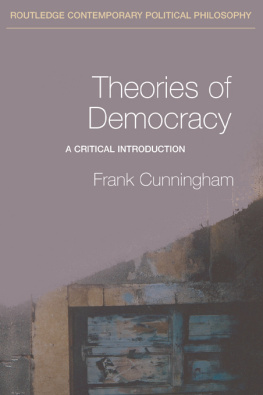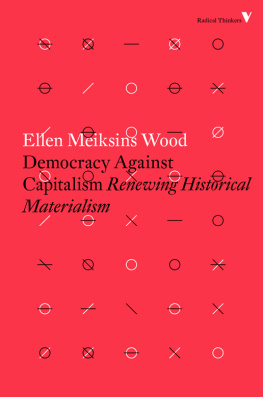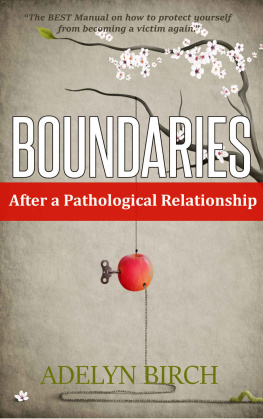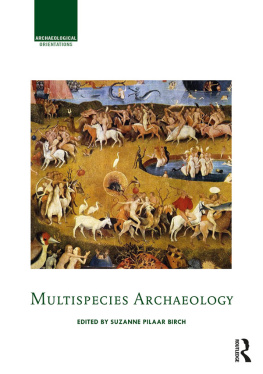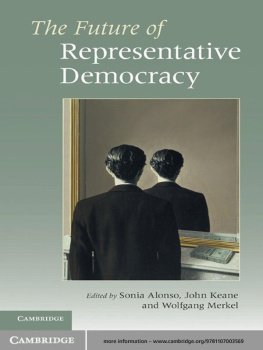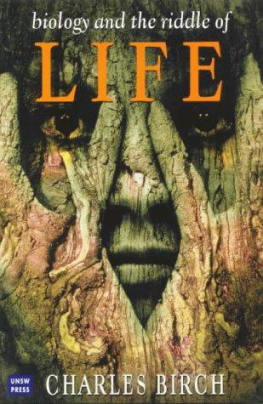Birch - The Concepts and Theories of Modern Democracy
Here you can read online Birch - The Concepts and Theories of Modern Democracy full text of the book (entire story) in english for free. Download pdf and epub, get meaning, cover and reviews about this ebook. City: London, year: 2007, publisher: Taylor and Francis; Routledge, genre: Politics. Description of the work, (preface) as well as reviews are available. Best literature library LitArk.com created for fans of good reading and offers a wide selection of genres:
Romance novel
Science fiction
Adventure
Detective
Science
History
Home and family
Prose
Art
Politics
Computer
Non-fiction
Religion
Business
Children
Humor
Choose a favorite category and find really read worthwhile books. Enjoy immersion in the world of imagination, feel the emotions of the characters or learn something new for yourself, make an fascinating discovery.
- Book:The Concepts and Theories of Modern Democracy
- Author:
- Publisher:Taylor and Francis; Routledge
- Genre:
- Year:2007
- City:London
- Rating:3 / 5
- Favourites:Add to favourites
- Your mark:
- 60
- 1
- 2
- 3
- 4
- 5
The Concepts and Theories of Modern Democracy: summary, description and annotation
We offer to read an annotation, description, summary or preface (depends on what the author of the book "The Concepts and Theories of Modern Democracy" wrote himself). If you haven't found the necessary information about the book — write in the comments, we will try to find it.
Birch: author's other books
Who wrote The Concepts and Theories of Modern Democracy? Find out the surname, the name of the author of the book and a list of all author's works by series.
The Concepts and Theories of Modern Democracy — read online for free the complete book (whole text) full work
Below is the text of the book, divided by pages. System saving the place of the last page read, allows you to conveniently read the book "The Concepts and Theories of Modern Democracy" online for free, without having to search again every time where you left off. Put a bookmark, and you can go to the page where you finished reading at any time.
Font size:
Interval:
Bookmark:

This highly acclaimed and popular academic text is now available in a new edition, having revised and updated the analyses of the use and abuse and ambiguity of many essential concepts used in political discourse and political studies. These include basic concepts such as liberty, democracy, rights, representation, authority and political power.
New to this edition are three sections of great topical interest:
- Entirely original analysis of global terrorism, which puts the recent development of Islamic terrorism into perspective by comparing it with earlier examples of terrorist tactics by a variety of state agencies, revolutionary groups and minority nationalist movements.
- Extended discussion on multiculturalism, which supplements theoretical arguments with succinct summaries of the differing ways in which ethnic and cultural minorities have been dealt with in Canada, Britain, France and the Netherlands.
- A section on democratization that focuses on the problems, social and political and even theological, involved in turning authoritarian regimes into stable democracies in the Middle East and elsewhere.
The Concepts and Theories of Modern Democracy is a stimulating guide to current world problems as well as essential reading for university politics.
Anthony H. Birch is Emeritus Professor at the University of Victoria, Canada. He has London degrees and pursued postdoctoral studies at Harvard and the University of Chicago. He has taught political science at universities in England, the United States, Australia and Canada, has published eight books and numerous articles, has served for three years as Vice-President of the International Political Science Association and is Fellow of the Royal Society in Canada.
To Dorothy Madeleine Birch
First published 1993
Second edition, 2001
Third edition, 2007
by Routledge
2 Park Square, Milton Park, Abingdon, Oxon OX14 4RN
Simultaneously published in the USA and Canada
by Routledge
270 Madison Ave, New York, NY 10016
Routledge is an imprint of the Taylor & Francis Group, an informa business
This edition published in the Taylor & Francis e-Library, 2007.
To purchase your own copy of this or any of Taylor & Francis or Routledges collection of thousands of eBooks please go to www.eBookstore.tandf.co.uk.
1993, 2001, 2007 Anthony H. Birch
All rights reserved. No part of this book may be reprinted or reproduced or utilised in any form or by any electronic, mechanical, or other means, now known or hereafter invented, including photocopying and recording, or in any information storage or retrieval system, without permission in writing from the publishers.
British Library Cataloguing in Publication Data
A catalogue record for this book is available from the British Library
Library of Congress Cataloging in Publication Data
A catalog record for this book has been requested
ISBN 0-203-96365-2 Master e-book ISBN
ISBN10: 0-415-41463-6 (pbk)
ISBN10: 0-415-41462-8 (hbk)
ISBN10: 0-203-96365-2 (ebk)
ISBN13: 978-0-415-41463-0 (pbk)
ISBN13: 978-0-415-41462-3 (hbk)
ISBN13: 978-0-203-96365-4 (ebk)
I am grateful to Cambridge University Press for permission to reprint (in ) several paragraphs from my article entitled Economic models in political science: the case of exit, voice, and loyalty that first appeared in 1975 in the British Journal of Political Science, 5(1): 6982.
For assistance in preparing this edition, my thanks go again to my good friend Bernie Wainewright. I am also grateful to the staff of the University of Victoria library, whose helpfulness has made it the most agreeable of the many academic libraries in which I have worked. And my thanks go to my secretary, Catriona Kaufman, who has coped with my untidy manuscript with great patience and efficiency.
Finally, and as ever, I am grateful to my wife, Dorothy, for her support and encouragement.
A.H.B.
This is a book about the concepts and theories that are invoked when people discuss politics and government in modern democracies. It examines a variety of theories, both analytical and evaluative, and approaches them by analysing some basic political concepts because ideas about politics can only be expressed by using concepts.
A concept is defined by the Oxford English Dictionary as an idea of a class of objects, a general notion or idea, and by Websters Dictionary as an abstract or generic idea generalized from particular instances. A political concept is an abstract idea about politics and people who discuss political matters use political concepts all the time. They cannot avoid doing so, because, as a British philosopher has said, our idea of what belongs to the realm of reality is given for us in the language that we use. The concepts that we have settle for us the forms of the experience we have of the world (Winch 1958: 15). An American political theorist has said much the same with particular reference to politics, observing that in political life our language is not just a neutral medium from some independent reality but instead is partly constitutive of that reality (Herzog 1991: 141).
The problem for all those who observe, study or participate in politics (and in modern societies that means most people) is that many political concepts are ambiguous, value-laden and subject to more than one meaning or interpretation. The object of this book is to examine some of the basic concepts of modern politics so as to clarify their meaning or meanings, to indicate the implications of using them in one sense rather than another, and to discuss their utility in political analysis.
In the course of doing this various familiar theoretical controversies will be thrown into a new light and examined from a relatively detached viewpoint. These include controversies about the power of the national state, the bases of political authority within the state, the nature of democratic ideals, the relationships between economic and political power, the case for extending popular participation in government, and the nature of minority rights. Because students of politics have varied widely in their methods of analysis, as well as in the nature of their political values, the final two chapters of the book will discuss the main methods adopted by political scientists and make suggestions about their relative utility.
An example may illustrate the nature of the conceptual problems involved in discussing politics. If it is said that George W. Bush became president of the United States in 2001, this is a simple historical statement that does not employ any concepts. If it is said that the American president wields extensive executive powers conferred on him by the constitution, this statement employs a concept with a fairly low level of generality, namely executive powers; but it does not involve any ambiguity or uncertainty as the powers in question are set out in a legal document. However, if it is said that the American president enjoys more political power than the prime minister of Britain, this statement hinges on a concept with a rather high level of generality, namely political power. There are problems about defining political power and disagreements between political analysts as to how its extent should be assessed or measured. That these problems and disagreements are serious will be clear to anyone who reflects for a moment on a further proposition sometimes advanced, namely that the industrial-military complex in the United States wields more power than the president.
Font size:
Interval:
Bookmark:
Similar books «The Concepts and Theories of Modern Democracy»
Look at similar books to The Concepts and Theories of Modern Democracy. We have selected literature similar in name and meaning in the hope of providing readers with more options to find new, interesting, not yet read works.
Discussion, reviews of the book The Concepts and Theories of Modern Democracy and just readers' own opinions. Leave your comments, write what you think about the work, its meaning or the main characters. Specify what exactly you liked and what you didn't like, and why you think so.

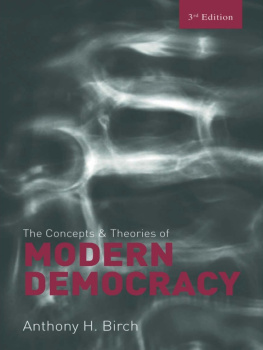


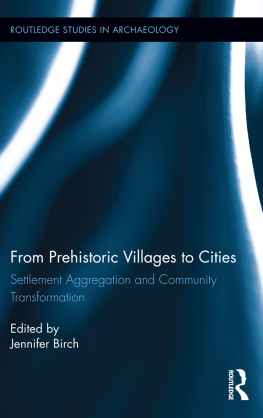

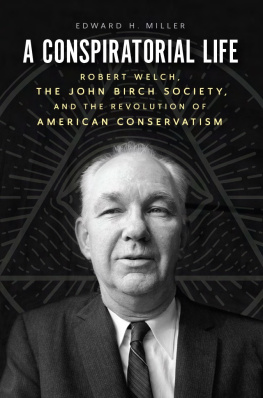
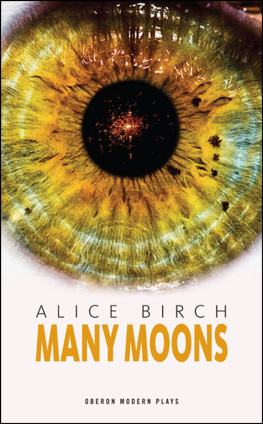
![Alice Birch - [BLANK] (Oberon Modern Plays)](/uploads/posts/book/297160/thumbs/alice-birch-blank-oberon-modern-plays.jpg)
